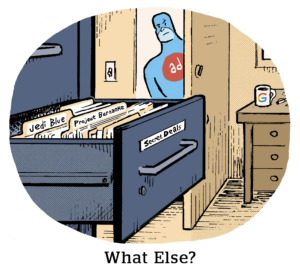Lobbyists representing media organizations – including giants like The New York Times, the Washington Post and CNN – are urging lawmakers to water down federal privacy bills like the recently stalled American Privacy Rights Act.
The planned federal privacy law would crush publishers that rely on targeted advertising, the lobbyists argue, effectively dismantling the free press and Americans’ first amendment rights.
This isn’t the first time news outlets have claimed that data privacy is incompatible with journalism, and it’s easy to see why: Today, most publishers are primarily in the business of selling their readers’ attention to advertisers. News sites monetize users’ data markedly more than non-news websites, with readers of The New York Times tracked by around 50 advertisers and data brokers every time they read an article.
This “corporate surveillance,” the term the FTC uses to describe targeted advertising, is at the core of some publishers’ current business models. That sentiment among regulators, and an increasing set of consumers, is the catalyst for the growing awareness in publishers that a change is needed.
The key is for publishers to reposition themselves as champions of data dignity.
The rise of data-funded news
News organizations first began collecting online data after print revenues were decimated by the rise of the internet. Print circulation has plummeted by two-thirds since the mid-1990s, and ad revenues have taken a corresponding dive. Virtually all news outlets that survived the crash did so by tracking their readers and partnering with data brokers to build sprawling programmatic advertising capabilities.
That’s problematic for two reasons. First, it leaves news organizations playing catch-up. There’s no realistic way for publishers to beat giants like Google and Meta at the data-collection game. While tracking your users can generate short-term revenues, in the long run the tech giants will come out on top. The further behind publishers fall, meanwhile, the more urgently they feel the need to squeeze maximal value – and maximal data – from their readers.
That leads to the second problem: Harvesting data and lobbying against consumer protections cuts against news outlets’ core brand as principled organizations with their readers’ best interests at heart. At a time when less than a third of Americans trust the news media, taking liberties with readers’ data is a quick way to further sour the core relationship on which news organizations rely.
The rise of social media has already taken a toll: Despite chasing readers across the social web, news websites currently get less than 1% of their traffic from social media referrals. Now, AI-powered search tools are throwing a new wrench in the works by allowing consumers to access news without visiting publishers’ sites.
Put data dignity first
One option, of course, is to simply acquiesce to the AI takeover: We’re already seeing some major publishers, including News Corp and Politico parent group Axel Springer, signing lucrative deals trading away their content to OpenAI.
Another option, though, is for publishers to remember that their core customers aren’t AI giants, data brokers or advertisers. By repositioning themselves as defenders of consumers’ data dignity, news publishers could strengthen that essential relationship.
Taking a forthright pro-consumer stance on issues like transparency and data controls would make it easier for publishers to attract and retain paying subscribers – people who don’t want to get their news from a chatbot and who are willing to pay publishers for reliable, high-quality content.
Some big publishers are already refocusing on subscription-based business models: Even before partnering with OpenAI, News Corp. got just 16% of revenues from advertising and 44% from subscriptions. The New York Times similarly hit $1B in digital subscription revenues last year, lifting overall revenues even as advertising income fell.
Other publishers are also reemphasizing the reader relationship. Vox just started offering subscriptions, while the Guardian now nets 57% of its US revenues – accounting for one-third of global digital revenues – from reader donations. Such models, however, depend upon maintaining the trust and confidence of your readers.
Trust and transparency
Prioritizing trust and transparency wouldn’t mean sacrificing ad revenues. The point of data dignity isn’t that organizations should stop using data; it’s that they should put consumers in charge of how their data is used and empower them to make more meaningful choices. Research shows that consumers are perfectly willing to exchange their data for things they value.
By winning and retaining loyal subscribers who actively opt in to share more data than they otherwise would, publishers will ultimately wind up with a richer source of high-quality and properly permissioned data derived from readers with whom they have an enduring connection.
The news media should focus on pushing back against the spread of low-quality ad-driven and AI-generated content. That starts with taking readers’ data rights seriously – and advocating for the transparency and meaningful data controls that both consumers and publishers deserve.
“The Sell Sider” is a column written by the sell side of the digital media community.
Follow The Ethical Tech Project and AdExchanger on LinkedIn.

















